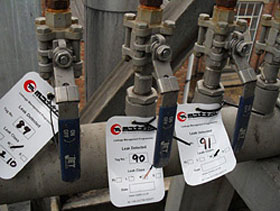Repairing leaks can improve compressor efficiencies
Investing in a new, modern compressor can result in huge energy and carbon savings - but there are other actions a business can take to ensure their compressed air system is operating as efficiently as possible. Here John Taylor, business development manager at Mattei, explains why rectifying air leaks can result in significant energy and cost savings.
Many businesses will currently be searching for ways to improve their energy efficiency and reduce costs - and in the industrial sector, automation is a good place to start. Most businesses using automation for all or part of their manufacturing processes generally rely on a mix of electrical and pneumatic technology - with electrically driven air compressors accounting for around 10 per cent of their electricity costs.
Therefore, when looking to save energy, manufacturers should be assessing their compressed air systems- especially because the electricity consumed during operation actually accounts for 75 per cent of the total lifetime cost of a compressor.
However, despite this fact, many businesses don't pay enough attention to compressor efficiencies. Compressors tend to be regarded as 'fit and forget' products - but this is rarely the best approach. Even if a compressor has low maintenance requirements, the system and the machine will still need to be checked on a regular basis to ensure they are working efficiently and to their optimum performance.
When the efficiency of a compressed air system does come under scrutiny, there is often a misconception that a replacement purchase is the only way to make substantial improvements. Over recent years significant advancements have been made in compressor technology, so it's true that replacing an old machine with a modern equivalent will result in energy savings. However, before purchasing a new compressor, it's important to check that the system as a whole is working efficiently. Otherwise, the case for replacing the compressor could be based on misleading figures, and the investment could prove to be false economy.
One of the most important things to check is whether any air leaks are present. Compressed air is far from free - but many companies actually waste as much as 50 per cent of the compressed air they generate simply to serve leaks in the system.
The good news is that leaks can be identified and rectified. And, with a (conservative) estimation of a 30 per cent average loss at each site, it's easy to see the cost saving potential.
According to the Carbon Trust, air escaping through a single 3mm hole could cost a business nearly £700 per year in energy costs. But a typical compressed air system will have more than just one hole - a medium-size manufacturer will generally have between 200 and 1,000 leaks in their system. So, for a company using 50m3 of compressed air per minute, we estimate the annual savings would be in the region of £63,072, although British Compressed Air Society (BCAS) figures suggest a much higher saving of £118,260. Larger companies with relatively high compressed air consumption of 100m3 per minute or above could expect to save at least £236,520 per year according to BCAS, or £126,144 according to Mattei's figures.
So, identifying and repairing leaks can be a simple and cost-effective way to reduce the cost of producing compressed air - and a new machine might not be needed at all. But unfortunately some compressor companies are purely interested in selling new machines, whether it's in the customer's best interest or not.
Mattei has always taken a best practice approach; we want to give our customers the best service possible, and provide the right solution for them. With this in mind, we have recently set up a leak detection service, which can definitely be worthwhile in terms of return on investment.
The average cost of a Mattei leak detection survey is less than 10 per cent of the overall leakage costs. After leaks have been identified, we recommend a corrective maintenance repair programme - again the cost of this is less than 10 per cent of the overall leakage costs. Once improvements have been made, the savings are immediate - and most companies have a payback period of less than six months. The savings are also long-term, although we suggest the system is checked for leaks every year.
Increasing the efficiency of a compressed air supply shouldn't just be based on replacing the compressor - sometimes the best approach is to make improvements to the system, rather than investing in a new machine. Air leaks have a serious impact on efficiency, and ensuring they are repaired can save huge amounts of energy and money - whether a new compressor is purchased or not.
For more information about Mattei and its ranges of compressors, Contact Us.
Back to archived news
